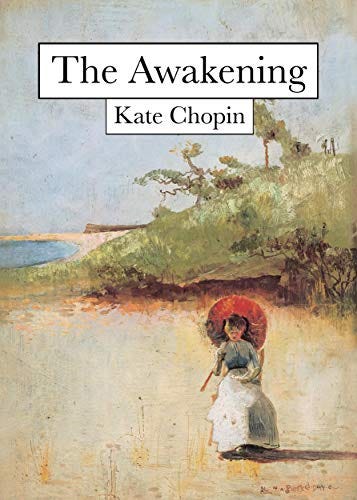The Awakening by Kate Chopin
Genre: Classic
Rating: 4 stars
“I would give up the unessential; I would give up my money, I would give up my life for my children; but I wouldn’t give myself. I can’t make it more clear; it’s only something which I am beginning to comprehend, which is revealing itself to me.”
Kate Chopin’s turn-of-the-century feminist novel, The Awakening, raised a lot of hackles when it was first published in 1899. Deemed scandalous because of the protagonist’s adultery and abandonment of her children, the book was not in circulation for several years. Reading Chopin’s masterwork in the 21st century left me with two thoughts; the themes discussed in the novel are much more digestible and almost tame today, yet they are not dated. The year has changed, and so has the scenario, but women somehow still face similar conflicts today in their married lives.
The Awakening is the story of the emotional and sexual awakening of Edna Pontellier, a young wife and mother of two boys. The novel starts with Leoncé Pontellier, her husband, reading a newspaper on a rocking chair as he waits for his wife to get back from her swim. The Pontellier family are vacationing in Grand Isle, a summer resort on the coast of Louisiana. While there, Edna finds herself on the receiving end of attention from a young man Robert Lebrun, and that’s where the story picks up.
Before the vacation and her awakening, Edna led a resigned life. She was married to a man who was not cruel or abusive but wasn’t attentive or loving either. The only thing they had in common was the bed that they shared. Her life was expected to revolve around her young boys and the household. Everything had to be perfect in order to maintain pretence in front of Society so that it didn’t affect her husband’s business. Edna didn’t know that she could get more out of her life, that she could be happy and loved. One night in Grand Isle, she realises that the life she is leading is not the life she really wants.
Unlike what most people believe on first reading the book, Edna’s awakening does not come from her interactions or friendship with Robert but instead from within. As the reality of her life sets in, she realises that she deserves more than a husband who calls her a bad mother over imagined illnesses. Her awakening comes from looking at the people around her, solitude and exploring her own creativity. She not only awakens to her desires or sexuality but also to the idea that she is her own person, beyond being someone’s wife and someone’s mother. Chopin’s writing here comes into play through brilliant prose and metaphors.
The book receives a lot of flak for portraying a woman who is selfish and ready to abandon her children for the sake of her own happiness. But isn’t Leoncé, with his occasional bonbons and gifts, equally to blame for ignoring his children? Why is it that women are the only ones criticised for wanting their own identity? Chopin, through Edna, gives us a memorable character because of her flaws and realism. The personal narrative of the story forces us to forge a bond with the main character to the very end. From being regarded as property by her husband to asserting to Robert that she wasn’t Leoncé's to give or his to take, Edna goes through an impactful transformation.
The novel also explores several personality types through a cast of side characters, each one of whom is unique and brings something to the table to make the reading experience more wholesome. Chopin’s writing grounds itself in reality, and what shocked me the most was how much I could relate to it more than 120 years later. The only contention I had with the book was that for a story that had me so gripped that I read it in one sitting, the ending was slightly underwhelming. Towards the beginning of the novel, Edna is learning how to swim; it is only at the end that I understood the importance of the repeated scenes of swimming and the joy she got from it.
Kate Chopin’s The Awakening is an important piece of feminist literature that leaves you thinking about the true cost of freedom. However, as any self-respecting reader would, I find forgiving Robert for his spoiler tendencies slightly difficult. “He looked at Edna’s book, which he had read; and he told her the end, to save her the trouble of wading through it, he said.”

